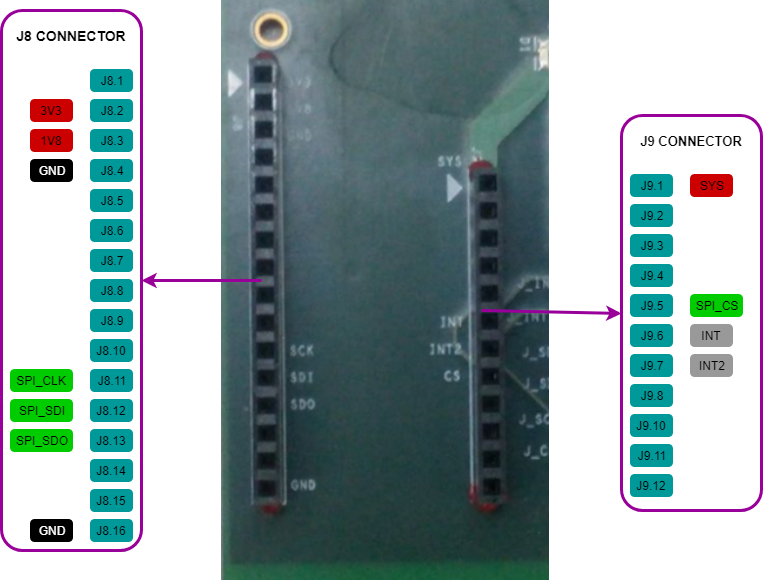Host software for the MAX30001 ECG, PACE, biopotential, bioimpedance, R-to-R peak sensor. Hosted on the MAX32630FTHR.
Dependencies: SDFileSystem USBDevice max32630fthr
Fork of MAX30001 SYS EvKit by
MAX30001-MAX32630FTHR ECG Evaluation System
The MAX30001 EVKIT SYS-MBED Evaluation System (EV System) is used to evaluates the MAX30001 sensor, which is an ECG (electrocardiogram), biopotential and bioimpedance analog front end solution for wearable applications. The full evaluation system consists of the MAX32630FTHR board, MAX30001 EVKIT sensor board and the evaluation software. The evaluation kit features ECG, PACE, R-to-R (R-peak timing) detection; bioimpedance (BioZ) AFE; and raw data logging.
The MAX30001 EVKIT evaluation system is assembled, tested and contains the necessary circuitry and connections to evaluate the MAX30001 ECG sensor.
When evaluated as an evaluation system, the MAX32630FTHR board provides the necessary logic rails, master clock, SPI, USB-to-Serial interfaces that are needed to evaluate the MAX30001 sensor board. MAX32630FTHR can be used as an independent development platform.
Communication between the PC and the MAX32630FTHR board is facilitated by a Windows 7, Windows 8 and Windows 10 compatible software that provides a simple and intuitive graphical user interface (GUI).
For more information, visit the wiki pages by clicking the wiki tab above and MAX30001EVSYS product page.
C++ source code, library for the MAX30001 ECG drivers are in the links at the bottom of this page. The sample code includes the ability to log data to the SD card of the MAX32630FTHR.
MAX30001 EVKIT Pinout Connections

Where to Buy
HSP/RpcServer/StringInOut.h
- Committer:
- Emre.Eken
- Date:
- 2018-04-13
- Revision:
- 4:10d2c2a56c2a
- Parent:
- 0:8e4630a71eb1
File content as of revision 4:10d2c2a56c2a:
/*******************************************************************************
* Copyright (C) 2016 Maxim Integrated Products, Inc., All Rights Reserved.
*
* Permission is hereby granted, free of charge, to any person obtaining a
* copy of this software and associated documentation files (the "Software"),
* to deal in the Software without restriction, including without limitation
* the rights to use, copy, modify, merge, publish, distribute, sublicense,
* and/or sell copies of the Software, and to permit persons to whom the
* Software is furnished to do so, subject to the following conditions:
*
* The above copyright notice and this permission notice shall be included
* in all copies or substantial portions of the Software.
*
* THE SOFTWARE IS PROVIDED "AS IS", WITHOUT WARRANTY OF ANY KIND, EXPRESS
* OR IMPLIED, INCLUDING BUT NOT LIMITED TO THE WARRANTIES OF
* MERCHANTABILITY, FITNESS FOR A PARTICULAR PURPOSE AND NONINFRINGEMENT.
* IN NO EVENT SHALL MAXIM INTEGRATED BE LIABLE FOR ANY CLAIM, DAMAGES
* OR OTHER LIABILITY, WHETHER IN AN ACTION OF CONTRACT, TORT OR OTHERWISE,
* ARISING FROM, OUT OF OR IN CONNECTION WITH THE SOFTWARE OR THE USE OR
* OTHER DEALINGS IN THE SOFTWARE.
*
* Except as contained in this notice, the name of Maxim Integrated
* Products, Inc. shall not be used except as stated in the Maxim Integrated
* Products, Inc. Branding Policy.
*
* The mere transfer of this software does not imply any licenses
* of trade secrets, proprietary technology, copyrights, patents,
* trademarks, maskwork rights, or any other form of intellectual
* property whatsoever. Maxim Integrated Products, Inc. retains all
* ownership rights.
*******************************************************************************
*/
#ifndef _STRINGINOUT_H_
#define _STRINGINOUT_H_
#include "mbed.h"
#include "USBSerial.h"
/// indicates that a string up to a CRLF is being accumulated
#define GETLINE_WAITING 1
/// indicates that a string is being processes
#define GETLINE_PROCESSING 2
/// indicates that a CRLF string has been buffered and can be processed
#define GETLINE_DONE 3
/**
* @brief Clear the incoming USB read fifo
*/
void clearOutReadFifo(void);
/**
* @brief Block until a character can be read from the USB
* @return the character read
*/
char getch(void);
/**
* @brief Place incoming USB characters into a fifo
* @param lineBuffer buffer to place the incoming characters
* @param bufferLength length of buffer
* @return GETLINE_WAITING if still waiting for a CRLF, GETLINE_DONE
*/
int getLine(char *lineBuffer, int bufferLength);
/**
* @brief Block until a fixed number of characters has been accumulated from the
* incoming USB
* @param lineBuffer buffer to place the incoming characters
* @param maxLength length of buffer
*/
void getStringFixedLength(uint8_t *lineBuffer, int maxLength);
/**
* @brief Output a string out the USB serial port
* @param str output this str the USB channel
*/
int putStr(const char *str);
/**
* @brief Place incoming USB characters into a fifo
* @param data_IN buffer of characters
* @param len length of data
*/
int fifoIncomingChars(uint8_t data_IN[], unsigned int len);
/**
* @brief Outut an array of bytes out the USB serial port
* @param data buffer to output
* @param length length of buffer
*/
int putBytes(uint8_t *data, uint32_t length);
/**
* @brief Outut 256 byte blocks out the USB serial using writeBlock bulk
* transfers
* @param data buffer of blocks to output
* @param length length of 256-byte blocks
*/
int putBytes256Block(uint8_t *data, int numberBlocks);
#endif // _STRINGINOUT_H_

 ECG, PACE, R-to-R heart peak, Bio-Z, Biopotential sensor Evaluation Kit MAX30001
ECG, PACE, R-to-R heart peak, Bio-Z, Biopotential sensor Evaluation Kit MAX30001